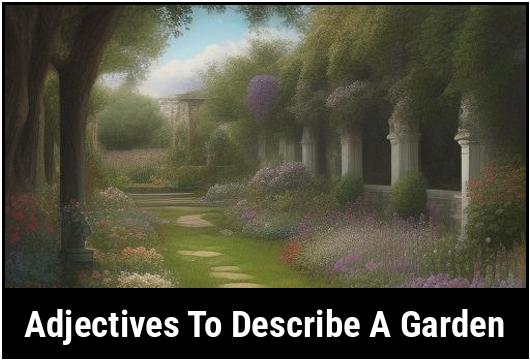- You are here:
- Home »
- adjectives
- » 31 Adjectives To Describe A Garden

31 Adjectives To Describe A Garden
Gardens are an oasis of tranquility, a feast for the senses, and a haven for serenity. When we think of a garden, various vivid and descriptive adjectives come to mind, evoking the imagery and essence of these beautiful landscapes. In this comprehensive guide, we will delve into the world of adjectives that can be used to eloquently describe a garden, exploring the nuances of language that allows us to vividly capture the beauty and essence of these natural marvels.
Gardens have been a source of inspiration, solace, and beauty for centuries. They come in various shapes and sizes, each with its unique blend of colors, scents, and textures. Describing a garden through adjectives not only enhances its visual representation but also helps evoke emotions and sensations associated with it. Whether it’s a quaint English cottage garden, a vibrant botanical garden, or a peaceful Japanese zen garden, the use of appropriate adjectives can transport the reader or listener into the heart of its splendor.
Key Takeaways
- Gardens are intricate and diverse spaces that can be effectively described through a rich tapestry of adjectives.
- Adjectives play a crucial role in vividly articulating the visual, olfactory, and sensory elements of a garden.
- Tailoring the choice of adjectives to the specific type and ambiance of a garden can significantly enhance the descriptive narrative.
Adjectives To Describe A Garden
1. Tranquil
A well-designed garden provides a tranquil sanctuary where one can escape the hustle and bustle of daily life. The serenity of a garden, with its gentle breeze rustling through the leaves and the sound of birds singing, creates a peaceful ambiance that soothes the soul.
2. Vibrant
A garden bursts with vibrancy, with its blooms in vivid hues of red, yellow, pink, and orange. A riot of colors takes over, transforming even the dullest corners into a vibrant and lively space.
3. Fragrant
The scent of flowers and plants wafting through the air in a garden is truly intoxicating. The fragrance varies from delicate and floral to spicy and exotic, creating an olfactory symphony for all who visit.
4. Lush
A well-tended garden evokes a sense of lushness. Thick foliage, lush green grass, and towering plants create an oasis of abundance, giving a feeling of life and verdant beauty.
5. Calming
Gardens offer a sense of calmness and harmony. Whether it’s the peaceful sound of flowing water from a fountain or the gentle swaying of leaves in the breeze, the garden has the power to calm our restless minds and uplift our spirits.
6. Serene
Nature’s beauty is often at its best in a garden setting. With its carefully selected elements, a garden exudes a serene atmosphere. The combination of soft colors, soothing sounds, and natural materials creates a space that promotes relaxation and inner peace.
7. Picturesque
Every garden effortlessly becomes a picturesque masterpiece. The artistry of well-placed flowers, trees, and other elements combined with the interplay of light and shadow creates a scene worthy of any canvas or photograph.
8. Enchanting
Gardens have a magical quality that captivates the imagination. They beckon you to explore hidden pathways, discover secret corners, and revel in the enchanting beauty that unfolds with every step.
9. Welcoming
Gardens have a welcoming charm that embraces visitors with open arms. Whether it’s a well-manicured front yard or a thoughtfully designed entryway, a garden invites you in, encouraging you to explore its wonders and find solace within its embrace.
10. Tranquil
A garden is a sanctuary of tranquility, offering respite from the chaos of modern life. It provides a quiet refuge where one can escape the noise and stress, immersing themselves in nature’s soothing embrace.
11. Alive
A garden is a living entity, constantly evolving and changing with the seasons. It’s filled with the vitality of blooming flowers, buzzing bees, and chirping birds, creating a sense of vibrancy and energy.
12. Harmonious
Within the confines of a garden, everything seems to exist in perfect harmony. The carefully selected plants and their placement, the balance of colors, and the overall design create a cohesive and visually pleasing space.
13. Delicate
Gardens possess an inherent delicacy that can be seen in the tender petals of a rose or the fragile leaves of a fern. Delicate flowers and plants bring an ethereal beauty and a sense of fragility to any garden.
14. Breathtaking
A well-designed garden has the power to leave visitors speechless. Its sheer beauty and breathtaking vistas can evoke a sense of awe, making one pause and appreciate the extraordinary beauty that nature can create.
15. Nurturing
Gardens are places of nurture and growth. They provide nourishment, not just for the plants that inhabit their beds, but also for the souls of those who tend to them. In a garden, one can witness the miracle of life unfolding with every planted seed.
16. Majestic
Some gardens boast towering trees that reach for the sky, creating a majestic canopy overhead. These gardens inspire awe and admiration, with their grandeur reflecting the wonders of the natural world.
17. Serendipitous
Gardens are often filled with delightful surprises. Unexpected blooms nestled among the greenery or a hidden bench tucked away in a cozy nook create a sense of serendipity, where every turn reveals a hidden treasure.
18. Timeless
A beautifully designed garden stands the test of time. Regardless of changing trends or fashions, a garden retains its appeal and beauty, creating a timeless oasis that generations can enjoy.
19. Invigorating
A garden is a source of vitality and rejuvenation. Walking amongst the flowers, feeling the warm sunlight on your skin, and breathing in the fresh air fills you with a renewed sense of energy and invigoration.
20. Pristine
A well-maintained garden exudes a sense of pristine beauty. The immaculate lawns, neatly trimmed hedges, and perfectly arranged flower beds create an environment that is clean, refreshing, and pleasing to the eye.
21. Peaceful
A garden is a sanctuary of peace. It is a place where one can escape the chaos of the world, finding solace in the tranquility that nature provides. The stillness and quiet create an atmosphere that allows for introspection and inner calm.
22. Curated
A garden is a curated space, carefully planned and designed to evoke a specific mood or atmosphere. Each plant, flower, and decorative element is thoughtfully selected and placed, creating a cohesive and visually appealing composition.
23. Abundant
Gardens are overflowing with abundance. With their rich variety of plants, fruits, and flowers, they offer a bountiful feast for the senses. The abundant beauty of a garden reminds us of the abundance that nature provides us with.
24. Harmonious
Gardens possess a natural harmony that is aesthetically pleasing. The symphony of colors, textures, and scents seamlessly blend together, creating a harmonious and balanced environment.
25. Charming
One cannot help but be charmed by the allure of a garden. Whether it is the quaintness of a cottage garden or the elegance of a formal one, gardens have an irresistible charm that draws you in and makes you feel at home.
26. Refreshing
A garden offers a refreshing respite from the heat of summer. The shade of trees, the cooling breeze, and the sight of water features create a sense of coolness and refreshment, making a garden an oasis in the sweltering heat.
27. Captivating
Gardens have a way of captivating our attention and imagination. Their beauty is so captivating that it’s impossible to look away. Whether it’s the intricate patterns of a flowerbed or the mesmerizing dance of butterflies, a garden mesmerizes and enchants.
28. Nostalgic
A garden can evoke feelings of nostalgia, taking us back to simpler times or echoing memories of gardens we once knew. The scents, the colors, and the ambiance can transport us to a different era and awaken cherished memories.
29. Euphoric
Walking through a garden can induce a feeling of euphoria. The vibrant colors, the heady scents, and the symphony of nature can elicit a sense of joy and elation, making a garden an uplifting and mood-enhancing space.
30. Immaculate
Gardens that are meticulously maintained display an immaculate beauty. Every blade of grass is perfectly trimmed, every flower in full bloom, and every edge crisply defined. The immaculateness of a well-kept garden is a testament to the dedication and care of its gardener.
31. Therapeutic
Lastly, a garden holds therapeutic qualities. The act of tending to a garden, feeling the soil between your fingers, and watching plants grow can be a healing experience. Gardens provide a sense of solace, promoting mental well-being and offering a space for reflection and rejuvenation.
Why Use Adjectives To Describe A Garden
Adjectives are essential tools for painting a picture with words, enabling us to convey the multi-sensory experience of a garden through language. By using adjectives, we can capture the visual beauty, tactile sensations, and evocative ambiance of a garden. These descriptive words allow us to convey the lushness of foliage, the delicate fragrances of flowers, the tranquility of a space, and the overall mood and atmosphere of a garden. Whether it’s for creative writing, horticultural descriptions, or simply sharing the beauty of a garden with others, adjectives serve as the palette with which we can create a vivid and immersive portrayal of a garden’s essence.
How To Choose The Right Adjective To Describe A Garden
Selecting the right adjectives to describe a garden involves considering various factors such as the type of garden, its features, and the overall ambiance it exudes. When choosing adjectives, it’s important to consider the visual, sensual, and emotional aspects of the garden. For example, a lush, vibrant garden may be best described with adjectives like "verdant," "lush," or "vibrant," while a serene, contemplative garden may be better characterized by adjectives such as "tranquil," "meditative," or "soothing." Determining the predominant characteristics of the garden and the emotions it elicits will guide the selection of the most apt adjectives to accurately capture its essence.
Types Of Adjectives For Describing A Garden
1. Visual Adjectives
Visual adjectives bring to life the colors, shapes, and overall appearance of a garden. They paint a vivid picture of the garden’s aesthetic qualities, allowing the reader or listener to envision its visual splendor. Some visual adjectives commonly used to describe gardens include:
-
Vibrant: Describing a garden as vibrant evokes the image of rich, intense colors and a lively, energetic atmosphere.
-
Spectacular: This adjective conveys a sense of grandeur and awe-inspiring beauty, often suited for gardens with striking or magnificent features.
-
Picturesque: A picturesque garden conjures imagery of a scene so lovely, charming, or idyllic that it resembles a picture.
-
Ethereal: This adjective evokes a delicate, otherworldly beauty, often associated with gardens that exude a dreamy or transcendent quality.
2. Olfactory Adjectives
Olfactory adjectives are used to describe the scents and aromas present in a garden, capturing the olfactory experience that is an integral part of many gardens. These adjectives allow the reader to imagine the delightful fragrances that the garden offers. Some olfactory adjectives to describe a garden include:
-
Fragrant: Describing a garden as fragrant evokes the imagery of sweet, pleasant aromas wafting through the air, creating a sensory delight.
-
Aromatic: This adjective implies a garden filled with a variety of pleasant, distinctive scents that contribute to the overall sensory experience.
-
Redolent: Redolent describes a garden with a pervasive, evocative aroma that is strongly reminiscent of a particular scent or atmosphere.
3. Textural Adjectives
Textural adjectives focus on the physical feel and touch of the garden’s elements, such as foliage, petals, and surfaces. These adjectives enhance the sensory experience by evoking the tactile qualities of the garden. Some textural adjectives suitable for describing a garden include:
-
Velvety: Describing a garden as velvety imparts a sense of softness, smoothness, and luxurious texture, often associated with certain plant leaves or flower petals.
-
Crunchy: This adjective may be used to describe a garden with elements that emit a crisp, brittle, or satisfyingly crunchy texture when touched, such as certain dried leaves or seedpods.
-
Prickly: Prickly conjures the sensation of sharp, spiky textures, often associated with cacti, thistles, or other plants with prickly foliage.
4. Emotional Adjectives
Emotional adjectives are used to convey the subjective and evocative qualities of a garden, capturing the feelings and moods it inspires. These adjectives help convey the emotional resonance and ambiance of the garden. Some emotional adjectives useful for describing a garden include:
-
Tranquil: Describing a garden as tranquil suggests a serene, peaceful atmosphere that promotes relaxation and calm.
-
Enchanting: An enchanting garden exudes a magical quality, captivating the senses and evoking a sense of wonder and delight.
-
Serene: This adjective conveys a sense of quiet, calm, and harmonious tranquility, often associated with Zen gardens or peaceful natural settings.
Gardens are multifaceted spaces that offer a symphony of colors, scents, textures, and emotions. Describing a garden using adjectives allows us to breathe life into its essence, enabling others to immerse themselves in the beauty and splendor it embodies. By carefully selecting adjectives that capture the visual, olfactory, textural, and emotional facets of a garden, we can craft a rich and evocative portrayal that does justice to the captivating allure of these natural sanctuaries. Whether through creative writing, botanical descriptions, or simply sharing the wonders of a garden with others, the art of choosing the right adjectives to describe a garden enriches our ability to communicate and appreciate the exquisite tapestry of nature’s bountiful flora.
Examples Of Adjectives For Different Types Of Gardens
A garden can be a beautiful and serene place that brings joy and tranquility to our lives. It is a space where nature thrives and blossoms, and where we can find solace and peace amidst the hustle and bustle of daily life. When we want to describe a garden, adjectives play a crucial role in painting a vivid picture and conveying the essence of its beauty. Whether it’s a small backyard garden or a sprawling botanical oasis, choosing the right adjectives can bring the garden to life in the reader’s mind.
-
Lush: A garden that is filled with abundant greenery, thriving plants, and a dense, vibrant atmosphere can be described as lush. The word "lush" conveys a sense of richness and fullness, often associated with a well-maintained and flourishing garden.
-
Serene: A garden that emits an aura of tranquility and calmness can be described as serene. This adjective evokes a sense of peace and provides an image of a garden that offers a peaceful retreat from the outside world.
-
Vibrant: A garden that is bursting with color and vitality can be described as vibrant. This adjective emphasizes the energetic and lively nature of the garden, highlighting the vivid hues and vibrant blooms that capture the eye.
-
Enchanting: A garden that possesses a captivating and enchanting quality can be described as such. This adjective suggests that the garden has an almost magical or fairy-tale-like aura, drawing in visitors with its beauty and charm.
-
Idyllic: A garden that seems perfect and picturesque, like a scene from a postcard, can be described as idyllic. This adjective conveys a sense of tranquility and natural beauty, making the garden appear like a peaceful paradise.
-
Pristine: A garden that is impeccably maintained and spotless can be described as pristine. This adjective emphasizes the cleanliness and neatness of the garden, suggesting a sense of order and meticulous care.
-
Fragrant: A garden that is filled with pleasant and aromatic scents can be described as fragrant. This adjective focuses on the olfactory experience of the garden, highlighting the delightful aromas and floral perfumes that pervade the air.
-
Breathtaking: A garden that elicits a strong emotional response due to its beauty and grandeur can be described as breathtaking. This adjective suggests that the garden leaves people awe-inspired and takes their breath away, leaving a lasting impression in their minds.
-
Exotic: A garden that features unusual and rare plant species, often from distant lands, can be described as exotic. This adjective emphasizes the unique and unfamiliar nature of the garden, showcasing plants and flowers that are not commonly found in the region.
-
Tranquil: A garden that exudes peace, calm, and a sense of stillness can be described as tranquil. This adjective creates an image of a garden that promotes relaxation and introspection, offering visitors a soothing and restorative experience.
These are just a few examples of adjectives that can be used to describe different types of gardens. By selecting the appropriate adjectives, one can effectively convey the atmosphere, aesthetics, and overall ambiance of a garden.
Common Mistakes In Using Adjectives To Describe Gardens
When using adjectives to describe a garden, it is crucial to avoid common mistakes that can detract from the overall impact of the description. Here are some mistakes to be mindful of:
-
Overusing generic adjectives: Generic adjectives like "nice," "beautiful," or "lovely" are often used to describe gardens. While these adjectives have their place, relying solely on them can make the description appear bland and uninspiring. It is essential to choose more specific and evocative adjectives to create a vivid image in the reader’s mind.
-
Neglecting sensory adjectives: Gardens are a multisensory experience, engaging not just the sense of sight but also smell, touch, and sometimes even taste. Neglecting sensory adjectives can limit the description and fail to capture the full essence of the garden. Incorporating adjectives that evoke the senses helps bring the garden to life in the reader’s imagination.
-
Failing to consider the purpose or theme of the garden: Different gardens serve different purposes and convey distinct themes. Failing to consider the purpose or theme of the garden when choosing adjectives can lead to a disjointed or inaccurate description. It is important to select adjectives that align with the intended mood and character of the garden.
-
Using conflicting or contradictory adjectives: In an attempt to be descriptive, one might inadvertently use conflicting or contradictory adjectives that confuse the reader. For example, describing a garden as both "wild" and "orderly" can create a contradictory image. It is crucial to choose adjectives that complement each other and create a cohesive portrayal of the garden.
-
Ignoring the context: The context in which the garden exists can greatly influence the choice of adjectives. For instance, a garden situated in an urban environment may necessitate different adjectives than a garden nestled in a rural setting. Ignoring the context can result in an inaccurate or disconnected description.
By being aware of these common mistakes, one can ensure that their description of a garden is accurate, engaging, and effective.
Using Adjectives Effectively
To use adjectives effectively when describing a garden, consider the following tips:
-
Be specific and precise: Instead of relying on generic adjectives, strive to be specific and precise in your descriptions. Choose adjectives that vividly capture the unique characteristics of the garden, such as the shape of the petals, the texture of the leaves, or the shade of a flower.
-
Incorporate sensory adjectives: Gardens offer a multisensory experience, so don’t forget to include sensory adjectives that engage all the senses. Describe the fragrances wafting through the air, the softness of the petals, or the sounds of buzzing bees and chirping birds. This helps the reader truly immerse themselves in the garden.
-
Consider the purpose and theme: When choosing adjectives, take into account the purpose and theme of the garden. If it is a formal garden, words like "elegant" or "symmetrical" might be appropriate. For a whimsical garden, words like "playful" or "charming" could be used. Aligning the adjectives with the garden’s purpose and theme enhances the accuracy and effectiveness of the description.
-
Use adjectives in combination: Pairing adjectives together can create a more nuanced and layered description of the garden. For example, using adjectives like "serene" and "exotic" paints a different image than just using one of them individually. Experiment with combinations to capture the unique atmosphere and character of the garden.
-
Consider the context: The context in which the garden exists can influence the choice of adjectives. Take into account factors such as the location, climate, or surrounding environment. This will help create a description that is in harmony with the garden’s context.
These tips can help you use adjectives effectively to create rich and impactful descriptions of gardens, allowing the reader to visualize and experience the beauty of the garden in their minds.
Exercises And Practice
To enhance your skills in using adjectives to describe gardens, here are a few exercises and practice suggestions:
-
Write a descriptive paragraph: Choose a garden that you are familiar with or imagine a garden in your mind. Write a descriptive paragraph using a combination of the adjectives mentioned in this article. Focus on engaging the reader’s senses and creating a vivid, immersive description.
-
Expand your vocabulary: Explore other sources such as books, articles, or even a thesaurus to discover new and unique adjectives. Expand your vocabulary to have a broader range of adjectives at your disposal when describing gardens.
-
Analyze existing garden descriptions: Read books, articles, or essays that describe gardens. Analyze how different authors use adjectives to create a sense of place and atmosphere. Identify the adjectives used and evaluate their effectiveness in creating a descriptive and engaging portrayal.
-
Visit gardens and observe: Visit different types of gardens, such as botanical gardens, public parks, or private gardens, and observe the surroundings closely. Pay attention to the colors, smells, textures, and overall ambiance. Take notes on your observations and later practice using adjectives to describe what you experienced.
By actively engaging in these exercises and practicing regularly, you can hone your skills in using adjectives to describe gardens and develop a stronger descriptive writing style.
Conclusion
Describing a garden is a task that requires the careful selection of adjectives to create a vivid and compelling portrayal. Adjectives play a vital role in conveying the atmosphere, aesthetics, and overall ambiance of a garden. By using specific, sensory, and contextually appropriate adjectives, one can paint a picture that immerses the reader in the beauty and tranquility of the garden. Through exercises and practice, we can enhance our skills in using adjectives effectively and bring gardens to life on the page. So, the next time you step into a garden, let your imagination flourish, and allow the right adjectives to bloom.
FAQS On Adjectives To Describe A Garden
What Are Some Common Adjectives Used To Describe A Garden?
Some common adjectives to describe a garden include lush, vibrant, peaceful, breathtaking, and enchanting.
How Can I Describe A Garden As Being Lush?
A garden can be described as lush when it is filled with thick, healthy vegetation that is green and full of life. This can include blooming flowers, dense foliage, and a variety of plant life.
What Does It Mean For A Garden To Be Vibrant?
A vibrant garden is full of color and energy. This can be achieved through a combination of different-colored flowers, plants, and foliage that create a bright and lively atmosphere.
How Would You Describe A Peaceful Garden?
A peaceful garden is one that promotes a sense of calm and serenity. This can be achieved through strategically placed seating areas, natural elements such as water features or wind chimes, and a tranquil color scheme.
What Makes A Garden Breathtaking?
A breathtaking garden is one that takes your breath away with its beauty and grandeur. This can be achieved through a combination of landscape design, striking or uncommon plant choices, and overall attention to detail that creates a visually stunning space.








